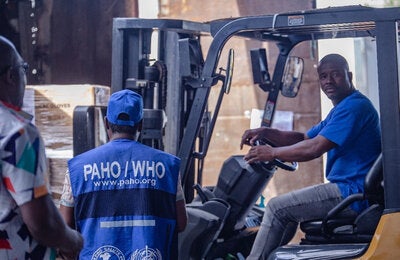
Georgetown, 26 November 2022 (PAHO/WHO) - Following the recommendations of the Global Leprosy Strategy 2021-2030, the Ministry of Health has developed, in collaboration with PAHO, a project aimed at widening the leprosy services coverage through screening for early case detection, strengthening of contact tracing, and interruption of transmission in an effort to achieve zero transmission of leprosy. This project, which is also supported by the WHO Global Leprosy Program and the Sasakawa Health Foundation, aims to increase the early detection of new leprosy cases using local Community Health Workers in the ten administrative regions of Guyana.
As a result, the Ministry of Health's Leprosy Program partnered with PAHO in implementing field activities focusing on care and treatment of leprosy patients while alternating with public health physicians in the management of control policies. Quarterly, there are medical interventions with active case detection in regions 1 and 2, with biannual visits to regions 7, 8, and 9. However, more focus was placed on leprosy interventions in the remaining high endemic cluster areas in regions 3,4,5,6 and 10.
During the period October and November 2022, the Ministry of Health and PAHO also received support from the Global Affairs Canada Project in conducting awareness sessions with school-age population at Primary and Secondary Schools in Regions 3, 4, 5, 6, 8, and 10.
In an effort to strengthen the program at the regional and sub-national levels, thirty-five (35) Health Care Workers, including Community Health workers from regions 3, 4, 5, 6, 8, and 10 were trained in case detection, management of cases, surveillance and how to administer the multi-drug therapy treatment.
In addition, the team visited 18 Health Facilities and 16 schools to distribute IEC materials, such as posters to increase knowledge on leprosy.
PAHO/WHO will continue to provide technical cooperation to the Ministry of Health to srenghten the Leprosy Program in Guyana.





